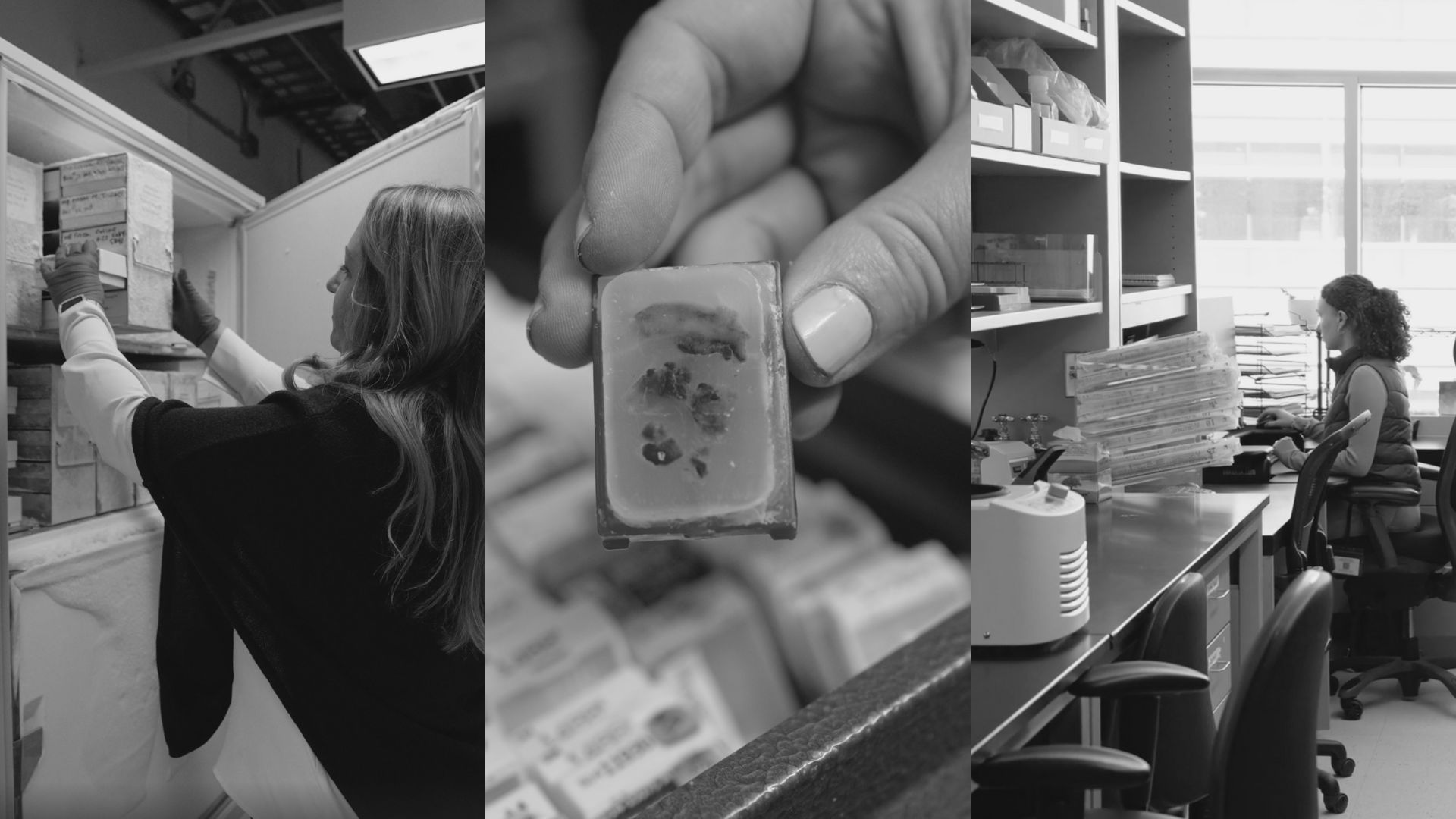The Melanoma Research Alliance’s newly launched Melanoma Biorepository represents a critical next step in the pursuit of improving the treatment and management of melanoma. Housed at the University of Colorado Anschutz Medical Campus (UCAMC), the biorepository collects and stores high-quality tissue samples–such as melanoma and normal tissues — alongside key demographic and clinical information from biorepository participants that qualified researchers can use to advance discoveries in diagnostics, treatments, and management strategies for all melanoma patients.
The biorepository collects tissues from patients with all subtypes of melanoma, with a focus on acral and mucosal melanoma. Consented participants can donate melanoma tissue being stored from prior surgeries or from future surgeries that have been scheduled.

“Biobanked samples, especially for rare melanoma subtypes, are notoriously difficult to access from existing biorepositories. By creating a centralized, researcher-friendly biorepository, MRA is removing a major barrier and enabling the kind of collaborative science that will drive real breakthroughs for patients.”

Patients, families and scientists will now have the opportunity to fuel discovery on an exponential scale. The combination of expanded patient participation through the donation of melanoma and normal tissues and increased researcher access will drive research and discovery, previously out of reach, inching us closer to improved predictive and prognostic biomarkers, precision treatments, and ultimately more cures.
The biorepository is a centralized, ethically governed, free bidirectional resource for participants and researchers and there is no cost to patients who participate.
A biorepository (also referred to as a “biobank”) collects human biological samples– such as blood, tissue (normal and cancerous), or body fluids–and associated health information. Samples and health information from patient donors are stored so they can be used by qualified researchers and clinicians for current and future research projects.
The purpose of the MRA Melanoma Biorepository is to collect and store melanoma tissue from patients with all types of melanoma. In some cases, blood and/or other normal tissue or saliva may be collected for comparison to the melanoma tissue. Tissue samples are most useful when they are connected to health data from the donor, including information on diagnosis, treatments, and responses. Samples will be used for research purposes to study the different types of melanoma, identify better treatments, and improve outcomes for melanoma patients. Scientists carrying out the research will not know the identities of individuals who donate tissue.
The MRA Melanoma Biorepository is an initiative led and sponsored by the Melanoma Research Alliance (MRA). MRA was formed in 2007 and is the largest non-profit funder of melanoma research worldwide. Since its founding and as of 2025, MRA has committed $175 million and leveraged an additional $500+ million from outside sources to fund life-saving melanoma research needed to achieve its mission of ending suffering and death due to melanoma.
Generally, you must be 18 years or older (or equivalent ‘adult’ age in particular states in the US) of any sex or ethnicity who has been diagnosed with any type of melanoma, including but not limited to cutaneous and the rare subtypes (acral, mucosal, uveal, etc.) and pediatric melanoma. The Biorepository will start with enrolling only English-speaking participants and expand to non-English speaking languages once the consent is translated to other languages and an appropriate translator is available to help with consent and collection.
Expanding research access to melanoma patient samples is necessary for accelerating scientific discovery. The MRA Melanoma Biorepository is designed to scale quickly, collecting patient tissue samples from prior and/or upcoming biopsies or surgeries. Additionally, for rare subtypes such as acral, mucosal, and uveal melanoma, scientific progress has been limited by the scarcity of patient samples that are often confined to independent research and clinical centers. The MRA Melanoma Biorepository addresses this challenge by providing a centralized resource for qualified researchers to access patient tissue samples, relevant clinical data that has been deidentified (removed of personal identifiers), and preclinical tools. Collectively, the Biorepository will allow qualified researchers to engage in accelerated and collaborative scientific studies focused on identifying new targets, biomarkers, and treatments that have the potential to improve health outcomes for melanoma patients.
Excess melanoma tissue samples from prior biopsies or surgeries that are no longer needed or are being used by your medical care team can be donated as well as excess melanoma tissue from upcoming surgeries. Sometimes it is important to collect normal samples (i.e., blood, saliva, etc.) so that a comparison can be made to the melanoma tissue sample obtained. Any excess blood that has been collected by your clinical team and is no longer needed for medical reasons can be donated. In addition, MRA can send directly to donors, kits for collecting saliva or cheek swabs that will be shipped directly to the Biorepository as another source of normal tissue.
If you are interested in donating your tissue sample(s), below are the steps:
Email biorepository@curemelanoma.org stating your interest in potentially donating tissue samples and/or finding out more information. Please include your legal name.
MRA and our consultants will address any questions you have and send you a consent form to review, which when read and signed, gives MRA permission to accept your donated tissue to the MRA Melanoma Biorepository. You should take as much time as you need to read this consent, ask questions of our staff and your doctor, and discuss this project with anyone before volunteering to donate your tissue. The consent can be electronically signed via Docusign and returned by email to MRA staff, or a signed paper copy can be returned to MRA.
In addition to the consent, a separate tissue donation form will be sent to collect your contact information as well as your doctor’s name and hospital information. Additional health information such as demographics, diagnosis, and treatment information will also be requested. Any identifying information, such as your name, address, phone number, email, etc., will not be shared with researchers.
MRA will arrange all shipments of your tissue samples from the hospitals to the Biorepository.
MRA, the sponsor of the research study, wants to make sure that you clearly understand how and why your tissue and associated health information are being requested. We also want you to be fully informed about the risks and benefits of participation. Documented informed consent will allow your tissue and samples to be used in future research. The informed consent statement, along with other materials, have been reviewed and approved by an Institutional Review Board (IRB), North Star Review Board. An IRB is an independent ethics committee that reviews research studies to protect the rights and welfare of research participants.
You will have to complete a tissue donation form to collect the following information:
Your contact information including your name, address, phone number, email, etc., so that MRA staff can contact you if they have questions about the tissue you wish to donate. Your contact information will not be shared with researchers.
The tissue you would like to donate and your doctor’s name and hospital information, so that MRA staff can arrange to have your tissue samples sent to the Biorepository.
Additional health information such as demographics, diagnosis, and treatment information.
Once you sign the consent and provide medical contact and health-related information, MRA will arrange the shipping of your tissue from the hospital to the Biorepository. If normal tissue is being requested like a cheek swab or saliva, we will send a kit to your home to get the donated tissue. We will provide a prepaid, labeled shipping container for you to send your tissue directly to the Biorepository.
No, we are currently only accepting donated tissue from patients who live within the United States.
Your samples may be used immediately or stored indefinitely for future use. Tissue may be used directly by cancer researchers, and/or they may be given the opportunity to create cancer models from the tissue. Researchers may study cancer cells and/or other cells in the tissue, such as those of the immune system. Blood and other donated fluids could be used to discover biomarkers of the disease to predict the likelihood of responding to therapy or being resistant to treatments. All researchers will have an approved protocol from their institution to use and study this tissue and will not have access to any identifiable information about you. Any research study using your samples must also be approved by a Tissue Use Committee of leading experts in the field of melanoma research appointed by the MRA. In addition, researchers must agree not to attempt to identify you from any information that they obtain from your samples.
No, the research results will not contribute to your medical care. This research study will not provide you with specific treatments for your melanoma and will not interfere with your continued medical care from your healthcare provider. You are being asked to contribute tissues and certain health information for general research purposes only. You may not benefit directly from taking part in this project. This research may only give us knowledge that will help melanoma cancer patients in the future.
No, at this time individual research results will not be returned. MRA, the sponsor, will share only general de-identified and summarized research developments on its public website, a designated data portal, or through scientific publications. If there is an opportunity to return your individual research results, you would be recontacted and then asked to sign a new consent to obtain the results.
We work very hard to keep your information confidential. Your medical information that is identifiable will be stored in a different database from your medical, non- identifiable information. Only authorized employees or consultants of MRA who have received special training and are certified in protecting human participant data will have access to your identifiable health information. Only non-identifiable medical information is shared with researchers.
Yes, if you are a participant in the MRA’s RARE registry, a direct-to-patient registry for patients with acral, mucosal, and cutaneous melanoma, you can donate tissue to the Biorepository. You will have to sign the Biorepository consent form to participate. You can indicate that you are a RARE Registry participant on the Tissue Donation form that you will be asked to fill out in addition to the consent. MRA will be able to associate information collected from you in the RARE registry with the information collected on your samples and associated health information from this biorepository study. If you do not want information shared between the two research studies, please contact the MRA Melanoma Biorepository by emailing biorepository@curemelanoma.org.
Yes, your participation is voluntary and should be based on what is important to you and your comfort to be included. It is your choice to participate in this study.
No, if you choose not to participate in this research study, it will not affect your present or future medical care or cause any penalty or loss of benefits to which you are otherwise entitled.
No, there are no fees associated with participating in this research study.
No, you will not be paid to participate in this research study.
Yes, if you agree to participate, you may leave at any time without penalty or loss of benefits to which you are otherwise entitled. If you wish to withdraw from this study and have your samples removed from the biorepository, samples can be destroyed immediately along with accompanying medical data associated with it. We will notify researchers to whom the specimens may have been distributed to also discard their aliquots of your samples and data, but cannot guarantee that they will be destroyed. MRA cannot retract research data from analysis of your samples that have already been published.
Please email biorepository@curemelanoma.org.
This work was supported, in part, by the Office of the Assistant Secretary of Defense for Health Affairs through the Rare Cancers Research Program under Award No. W81XWH2210768 and other generous supporters who have made the MRA Biorepository possible.